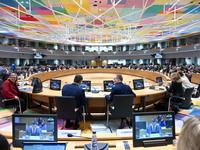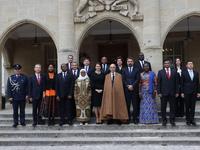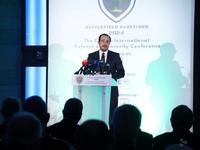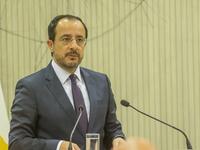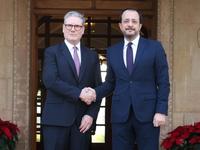Press Releases
09-05-2023 18:40
Speech by the President of the Republic Mr Nikos Christodoulides at the celebration of Europe Day, organised by the Office of the European Parliament in Cyprus and the Representation fo the European Commission EU House
I would, first, like to thank the Heads of the Office of the European Parliament and the Representation of the European Commission in Cyprus for the honour of inviting me to participate in this evening’s event, here at EU House in Nicosia, in order to pay tribute to an extremely important anniversary for Europe, our common home, our great family. Seventy three years ago today, Robert Schumann, inspired by the strategic thinking and intelligent political designs of Jean Monnet, made his well-known declaration in Paris that was set to change the flow of European history and eventually the lives of European citizens. As Robert Schumann himself stated on 9 May 1950: "Europe will not be made all at once or according to a single plan: it will be built through concrete achievements which first create a de facto solidarity."
Justly, therefore, we are today commemorating the Schumann Declaration in all corners of the EU: from Helsinki to Nicosia, from Lisbon to Warsaw and Rome, because this marked the beginning of European political unification and economic integration, which has led to what today we all know as the European Union. Personally, I have no hesitation in claiming that the added value the EU brings with it is the most important collective achievement of the human race in the European continent since the age of Enlightenment.
The establishment of the European Coal and Steel Community saw the beginning of a more general economic unification that would in the future form the core of the European Federation. The European governments of the six founding member states, for the first time in history, conceded part of their sovereignty to a supranational entity, the Supreme Authority, which would make decisions though its organised bodies, following common agreement.
The political dream of the renowned men and women who laid the foundations for peace in Europe through the establishment of the common institutions of the EU, which deal with our common European interests, is today as relevant as ever before. I sincerely believe that the EU would have even more added value if its institutional deepening goes further. If it developed even more common policies, if the member states concede an even greater part of our national sovereignty to our common supranational institutions. I am in favour of a gradual, step-by-step course aimed at building an EU with purely federal characteristics, precisely as Schumann and Monnet, and many others such as Altiero Spinelli, Paul-Henri Spaak and Simone Weil, envisioned the Federal Europe on 9 May 1950! The building of a federal EU is in my opinion something made necessary by our collective interest in today’s difficult and constantly changing globalised international framework. The EU member states can, not only survive, but also play a leading role in today’s international framework with its powerful geopolitical rivalries, only if we are together, united in our diversity, sharing the common values and principles on which our European edifice is firmly founded.
Strength through unity must be our guide and will constitute the legacy that must define our decisions. And it is this unity that we have demonstrated throughout all this time through a succession of crises that have knocked on our door (whether they concerned Covid 19 or the Russian invasion of Ukraine that we must maintain and safeguard as the apple of one’s eye.
Today, when unfortunately the war in Ukraine is still going on, it is extremely important not to waver in our support for the heroic fighting people of Ukraine. The message of united Europe must continue to ring out loudly. Let me be absolutely clear: we will never tolerate changes of borders that arise through violence and war. The illegal invasion by Russia cannot be tolerated. We can never accept the results of the Russian aggression on an independent sovereign state. It is for us a matter of principle and the highest priority to ensure that the international system will never fall into chaos and the right of the mighty will never cynically prevail over the weak. We in the EU will fight to the end for international law and the principles of the Founding Charter of the United Nations to prevail. We firmly believe in a multilateral global system governed by the rules of international law and a balance of powers, which will guarantee world peace and security. Our only choice is a world order based on rules. Moreover, for us – as the victims of invasion and occupation – I wish to make it clear: there is no other choice.
Since the time when I was head of Cypriot diplomacy, I have often publicly castigated the general tendency of the governments of member states to claim as their own the successes of the EU, which indeed, were won through tough negotiations, while for any difficult decisions that involved political cost, they put the blame on ‘evil Brussels’, on the impersonal bureaucrats in the institutions, on the circumstances that did not permit the adoption of their own positions, rather than (once again) tough negotiations. It is behaviours and attitudes of this kind by the political leaders of Europe that over time – and I say, against their will – have contributed to the hatching of an undesirable Euroscepticism and foster the cause of the Europhobic, nationalistic and populist forces in Europe, which fight tooth and nail against the EU and are fervent proponents of its dissolution.
Dear friends, I would like to state this evening before the EU ambassadors who are here among us, in the clearest possible way, that my government– throughout its term of office – will never adopt approaches of this kind. I have long experience and deep knowledge of the way in which the institutional decision-making process operates in the Union. I also have first-hand knowledge that the decisions made in Brussels generally have the consensus of the representatives of all the member states.
I do not claim that the EU is a community of angels and that the role and say of certain member states is not more powerful. I have no illusions. However, I have the clear position that tackling problems by small countries with a political problem, such as ours, would be much more difficult outside the EU. It is precisely in this framework that I have repeatedly and publicly stated that the accession of the Cyprus Republic to the EU in 2004 was the greatest success of our country at the international level since its establishment in 1960.
A very important milestone that will occur during my time in office will be the exercise of the Presidency by rotation of the Council of the EU by Cyprus in the first half of 1026. Personally, having been fortunate enough to have participated actively in the first EU presidency of Cyprus in the second half of 2012, I attribute great importance to this milestone. I am fully aware that our country will have a unique opportunity to contribute in a positive way through the Presidency and as an honourable intermediary in order to secure institutional consistency and to promote as many legislative bills as possible that will increase the benefit of the European unifying process. I also have in mind certain political initiatives that we can undertake in the framework of our Presidency in connection with political cooperation in the Mediterranean and the broader Middle Eastern region – our immediate neighbourhood – and which, in due course we will discuss with the High Representative of the Union and the European External Action Service.
If, the first, successful by all counts, Cyprus Presidency of the Council in 2012 marked the coming of age of the Cyprus Republic as an EU member state, the second Cyprus Presidency of the Council in 2026 must mark Cyprus as a totally reliable partner who, through its initiatives and concerted action, will head the Council and lead the unification process one step further.
It is in this framework that we must, as soon as possible, lay the foundations, first in Nicosia, in connection with the planning that will be required and the institutional structure that must be created, in order to ensure that we will be in a position to undertake action in good time and successfully bring about the results we will be aiming for in the context of our Presidency. Let us not forget that the Cyprus Presidency is part of the Triad of Presidencies, which begins with Poland in the first half of 2025, continues with Denmark in the second half of the year and concludes with Cyprus in the first half of 2026. It is consequently imperative to expedite our groundwork and be absolutely prepared from the start of 2024 to work closely with our partners in the Triad of Presidencies, both for drawing up the work programme and for assisting, whenever asked, in the work of the Presidencies of Poland and Denmark.
In this framework, it is extremely important to create the necessary structures in Nicosia, which will prepare the public administration of our country to ensure that it will respond successfully to this great challenge. Bearing in mind the experience of organising the first Cyprus Presidency of the Council, I would like to announce today that very soon I will be appointing a Deputy Minister to the President with competence in European Affairs, based on the model adopted in the first Cyprus Presidency of the Council. The person appointed will be someone with diplomatic experience and deep knowledge of the way in which the EU and its institutions operate.
The Deputy Minister for European Affairs will be answerable to the President of the Republic while at the same time he or she will act as the political head of the General Secretariat for European Affairs that was established in 2019 following my proposal to the Council of Ministers. The Deputy Minister will undertake the responsibility for the horizontal preparation of the Cyprus Presidency of the Council, he or she will represent Cyprus at the General Affairs Council and will contribute to the appropriate preparation of the President of the Republic for the EU summits, that is to say, the sessions of the European Council.
At the same time, on the occasion of the second Cyprus Presidency of the EU Council, it is my wish that we establish the necessary structures within the Cyprus government that will allow us to have better coordination of the positions of Cyprus in Brussels and, by extension, more effective management of our aims. In other words, Cyprus must speak with absolute consistency and with one voice in Brussels on all matters on the agenda of the Council and the EU in general, regardless of which ministry or state service has competency for examining a particular political issue or legislative file.
I would like to conclude my intervention by underlining the supreme importance of the participation of the Cyprus Republic as an equal EU member state. I am certain that you must have heard me underline many times in the past – as I have this evening - the fact that the accession of Cyprus to the EU was the greatest diplomatic success of the Cypriot people, since the establishment of the Cyprus Republic. Exactly 19 years since our accession we are, I believe, in a position to say that despite the difficulties and problems faced by the EU from time to time, the participation of Cyprus in the great European family forms a powerful political and diplomatic shield against those who might have their sights set on our national sovereignty and independence.
The continued division of Cyprus as a result of the Turkish invasion and occupation is, unfortunately, the greatest political anachronism within the otherwise most modern union of sovereign states in the world. The occupation of the northern part of Cyprus by Turkey remains an open wound on the body of the whole of the EU. The unresolved Cyprus issue is a par excellence European problem and it is to the interest of the EU as well as its obligation, to contribute actively in a leading role towards a final settlement of the problem, by using all the political and economic means and instruments at its disposal, in the framework of EU-Turkish relations. Our own goal is clear: we believe firmly in a solution to the Cyprus problem through the reunification of the island and its people within the agreed framework of the United Nations. We seek nothing less than what is enjoyed by the citizens of the rest of the member states of our Union.
One of Jean Monnet’s guiding principles in his efforts to solve problems was to add a new dimension to an issue, thus differentiating the initial framework of the problem: “You change the context, you change the problem,” he would say. I often think about these words by Monnet and I truly believe that through a more active involvement of the EU and a change in the context of the problem, by including the EU-Turkish dimension, we will be able to break the current deadlock and resume talks from the point where they were interrupted in July 2017, with the aim of the overall settlement of the Cyprus problem.
With this in mind, I will conclude my speech, by saying that for my government, and for myself a strong EU means a strong Cyprus. My political commitment is to work tirelessly both in the framework of my participation in the EU Council and more broadly, so that the EU will remain united and cohesive in this difficult time of geopolitical instability and the war, which has, unfortunately, returned to our continent. I have the unshakeable conviction that by remaining faithful to the founding values and principles of our Union, we can look forward to better days, we can look forward to an even better EU for the benefit of our citizens, and above all, the new generation of Europeans.
(RM/SCH)
Relevant Press Releases
